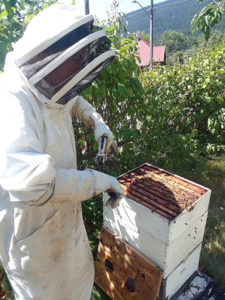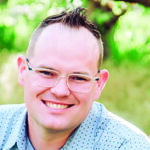Home »

Fascination with bees becomes hobby with sweet rewards
 College of the Rockies People: Their Courage, Curiosity, and Contributions
College of the Rockies People: Their Courage, Curiosity, and Contributions
As Regional Transition Coordinator at College of the Rockies, Brian Conrad assists students at eight high schools in our region to navigate Youth Train in Trades and dual credit opportunities.
“These programs get students involved in their education on a very personal level,” he said. “They get their grade 12 education, a sense of self, and a way to make a living. It’s a nice thing to see.”

The futures of local youth are not Conrad’s only focus, however. As a honey bee keeper for the past 24 years, he is also focused on helping the local bee population, a population that is in rapid decline.
“I took a night course about 24 years ago and was intrigued by the little critters,” he said. “I had an opportunity to get a couple of colonies and from then on my interest just kept growing.”
Currently Conrad has five colonies on his property in Moyie (each colony can have up to 60,000 bees). Though he remains fascinated by the intelligence of bees and the matriarchal, autocratic nature of a hive, he also enjoys the products his bees produce, especially the honey.
“I’m really proud of the quality of the honey they produce,” he said. “I’m not in a large agricultural area so, unlike store-bought honey which is often from one pollen source like clover or alfalfa, the honey my bees produce comes from wild plants, the odd domestic garden, and fruit trees. It has a really nice bouquet to it, and is quite different from big-scale commercial honey.”
Conrad also collects the wax that his bees produce, often trading it to local soap makers. Beeswax is often used in soaps, candles, and cosmetics, or can be used for waxing thread when tying flies.
Over the 24 years that Conrad has been keeping bees, he is pleased to see an increased consciousness about their importance.
 “It’s become a cool thing to have bees, and to talk about and be concerned about bees,” Conrad said. “It is much more mainstream than when I started, which is really good. The hope is that small beekeepers like me can eventually evolve a strain that is more resistant to the diseases that are afflicting them now. The more people who keep bees in different ways, in different places, the more chance for evolution to happen.”
“It’s become a cool thing to have bees, and to talk about and be concerned about bees,” Conrad said. “It is much more mainstream than when I started, which is really good. The hope is that small beekeepers like me can eventually evolve a strain that is more resistant to the diseases that are afflicting them now. The more people who keep bees in different ways, in different places, the more chance for evolution to happen.”
The devastation to honey bee populations due to climate, disease, and predators like skunks and bears have been well-documented. Finding ways to help the bees is crucial because approximately one-third of all food that we eat is made possible because of pollinators like honey bees. Beekeeping is not permitted in all communities in the region, but Conrad says there are things anyone can do to help them.
“Don’t attack your dandelions,” he said. “It is the first real food that bees have after a long winter. If dandelions aren’t available they have to wait for some other flowering plant to come along to get any real food.”
There are also many bee-friendly plants that can be planted in gardens. Most garden centres, or a quick Google search, can help to determine which ones are most attractive to pollinators like bees.
“They love flowering herbs: caraway, mint, oregano,” Conrad added. “But they can also be quite particular. Some of the bulb plants like daffodils and tulips are beautiful, but bees totally ignore them.”
Though he considers stopping beekeeping from time-to-time, Conrad’s fascination with the intelligence of the species, his desire to continue to help the bee population, and an appreciation for the honey and other products his bees produce, keeps him coming back each year.
“Unlike a lot of domestic animals, they really don’t tie you down that much,” he added. “There are certain critical times of the year that you have to do some management if you want to keep your bees healthy and, of course, you need a way to protect them from the vermin as best you can, but other than that, once they’re set up, you can relax and go to the beach.”
Photos submitted
College of the Rockies







